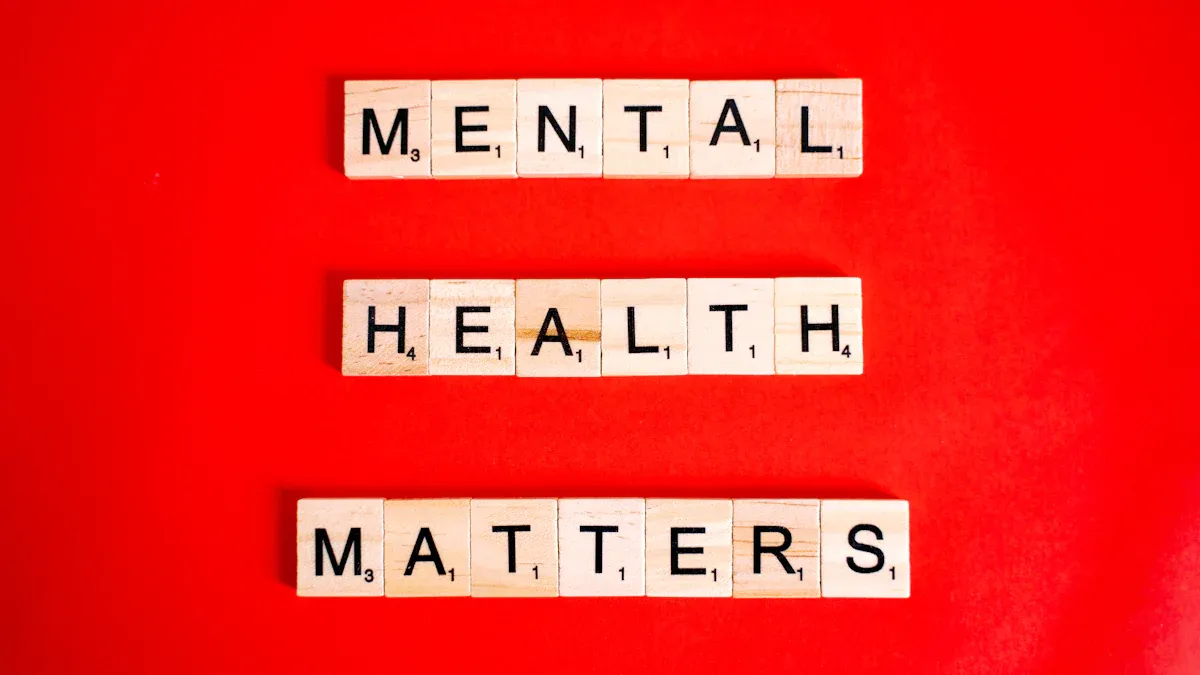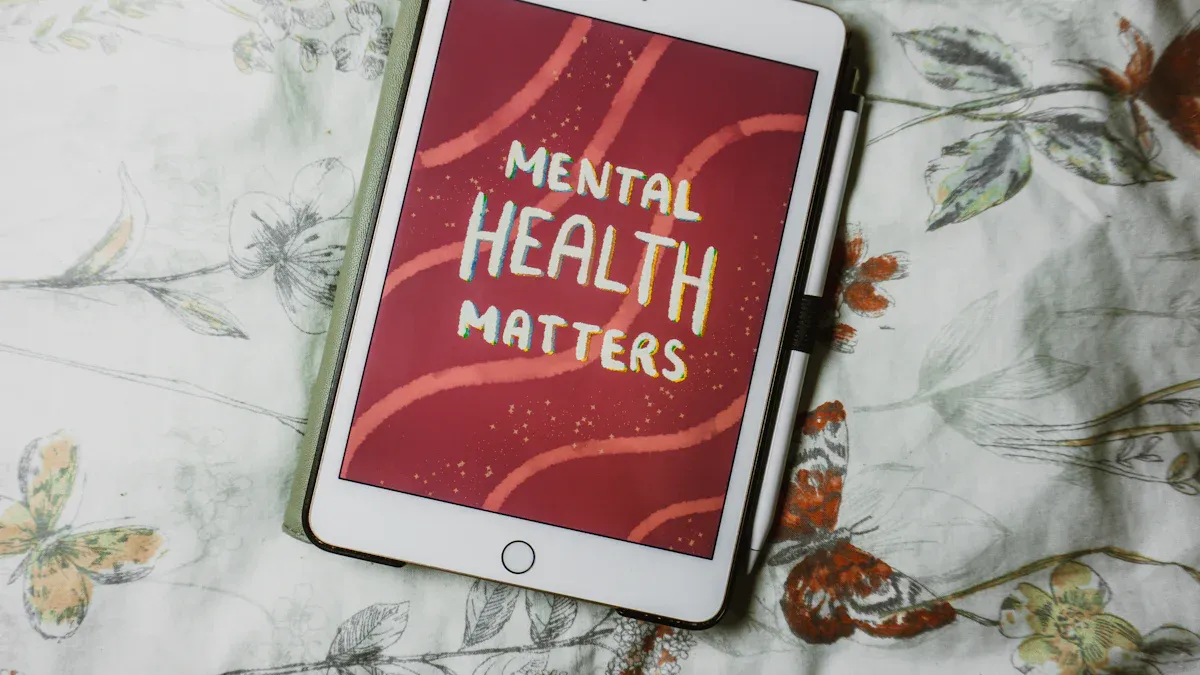How AI Addresses Mental Health Challenges in Modern Healthcare

AI in healthcare is changing how we treat mental health problems. It helps solve issues like cost and access to care. AI tools, like therapy apps, give personal help to patients. This works even if they live far away or have little money. For example, AI can predict how well antidepressants will work. It does this with 89% accuracy, helping doctors create better plans. This is very important in places where no psychiatrists are available. AI in healthcare studies big data to find patterns and prevent care gaps. It makes sure people get help early and in more places.
The Mental Health Crisis and Its Challenges

Rising Demand for Mental Health Treatment
Talking about mental health has become more common recently. This shows that more people now want mental health care. In the U.S., those seeking care grew from 7% in 1999 to 13.1% in 2018. People of all ages and backgrounds are asking for help. Between 2017 and 2018, more people needed care due to rising depression and anxiety. As mental health becomes more important, the need for easy-to-access treatment keeps growing.
Workforce Shortages in Mental Health Care
Even though demand is rising, there aren’t enough providers. Almost half of Americans live where mental health professionals are scarce. Many people can’t get the care they need. COVID-19 made this worse, with 78% of groups seeing more demand and 62% reporting longer wait times. Recruitment and keeping workers are problems for 97% of mental health groups. These shortages make it harder to meet growing needs.
Statistic | Percentage |
|---|---|
Groups seeing more demand | 78% |
Groups with longer waitlists | 62% |
Groups struggling with hiring and keeping staff | 97% |
We need solutions to close the gap between care demand and availability.
The Consequences of Mental Health Gaps
When people don’t get mental health care, it causes big problems. Untreated mental illness cost the U.S. $210.5 billion in 2010. In poorer countries, over 75% of people with severe mental illness don’t get help. Even in richer countries, 35% to 50% of people lack care. Mental health issues also hurt jobs, as fewer people can work.
Serious mental illness lowers life expectancy by 20-25 years.
Less than 20% of people with serious mental illness have jobs.
People with serious mental illness are 10 times more likely to go to jail than a hospital.
These facts show why fixing mental health gaps is so important for everyone.
AI in Healthcare: Closing Mental Health Gaps
AI Chatbots for Emotional Help
AI chatbots are changing how people get emotional help. These tools let you share feelings in a safe, judgment-free space. Unlike regular therapy, chatbots are always available, even late at night. They use smart language tools to understand your feelings and reply kindly.
Talking to AI chatbots can make you more open to getting help. Many people feel safer sharing personal problems with chatbots than with doctors. For example, some share secrets with chatbots they wouldn’t tell a therapist. This makes chatbots a helpful link to the care you need.
Chatbots also help you stay involved in your treatment. After using one, people often feel braver about talking to family or doctors. This makes chatbots a key part of AI care, offering quick help and lasting benefits.
Self-Check Apps for Early Warning
Self-check apps help you take charge of your mental health. These apps study your symptoms and guide you to professional help. Catching problems early is important to stop them from getting worse. AI is great at spotting patterns in your behavior that others might miss.
For example, AI can look at your sleep, social habits, or voice tone. This helps the app find early signs of issues like anxiety or depression. Studies show AI can spot mental health problems sooner, leading to better care. Using these apps helps you understand your health and take action early.
These apps don’t just find problems; they also give advice just for you. They might suggest calming exercises or connect you with a therapist. Self-check apps make mental health care easier and more personal.
Online Therapy and AI-Powered Treatment
Online therapy platforms are changing how you get mental health care. They mix human therapists with AI tools to give custom treatment. For example, AI can track your progress and suggest changes to your plan. This teamwork makes sure your care fits your needs.
A special feature of these platforms is using many AI helpers. Each helper does a job, like checking your mood or summarizing sessions. They work together to give you strong support. This teamwork makes online therapy more accurate and helpful.
AI tools like online CBT are showing good results. They adjust therapy to match your feelings in real time. AI also tracks your progress and predicts how well treatments will work. This keeps your therapy on the right path.
Studies prove AI works well in mental health care. Reviews show AI tools help manage symptoms and improve lives. These platforms make therapy easier to get and better in quality, helping you feel healthier.
Predictive Analytics for Proactive Mental Health Care
Predictive analytics helps find mental health problems early. It focuses on stopping issues before they become serious. This way, you can stay mentally healthy and avoid crises.
AI uses data to spot warning signs of mental health struggles. It looks at patterns in your actions, health history, and body signals. For example:
Vanderbilt University made a tool that predicts suicide with 80% accuracy using hospital records.
Cogito’s Companion listens to your voice to warn care teams about problems.
Biobeat’s wearable tech tracks heart rate and skin temperature to predict mood changes.
These tools work together to give help before things get worse.
AI also checks electronic health records to find people at risk. It uses machine learning to predict conditions like depression or anxiety early. This lets doctors offer care plans made just for you.
Tip: Catching problems early can make a big difference. AI tools can help you stay ahead of mental health challenges.
One cool thing about predictive analytics is how AI agents work as a team. Platforms like HeartWhisper use different agents for different jobs. One agent studies your emotions, while another predicts future problems. Together, they give a full view of your mental health.
This teamwork makes sure no detail is missed. Each agent focuses on one part of your care, making the process better and faster. Working together, they improve accuracy and save time.
Predictive analytics gives you control over your mental health. It offers tools that act early and are tailored to your needs. This ensures you get the right help when you need it most.
Benefits of AI in Mental Health Treatment

Making Care Affordable and Easy to Access
AI makes mental health care cheaper and easier to get. Regular therapy can cost $100–$200 per session, which is too much for many. AI tools, like chatbots, give emotional help for as little as $20 a month or even free. These tools are always available, day or night. This means you can get help whenever you need it. Because it’s affordable and always there, AI therapy helps people with money or time problems.
AI also saves money for doctors and clinics. It cuts costs and helps patients feel better faster. Studies show AI treatments work well for anxiety and depression. They often work as well as regular therapy. People trust and like using AI tools, making them a smart and cost-effective choice for mental health care.
Helping People in Hard-to-Reach Places
AI tools are great for helping people in areas with few doctors. Many live far from mental health clinics. AI chatbots fill this gap by giving quick help, even in remote places. They support people who face long waits or can’t pay for regular therapy. For example, someone in the countryside can use a chatbot for advice and support without traveling far.
These tools also break down cultural and age barriers. Younger people, like Gen Z and millennials, are more open to AI for mental health. About 36% of them are interested in AI therapy. This shows how AI can reach groups that might avoid getting help. By being affordable and easy to use, AI makes sure everyone can get care.
Customizing Care with Smart Data
AI changes mental health care by making it personal. It uses data to find patterns in your behavior. This helps therapists create plans just for you. For example, studies found five types of depression and 14 different states of it. This helps therapists match treatments to what you need, improving results.
Platforms like ieso study therapy session data to see what works best. This helps therapists change their methods based on your progress. AI also improves online therapies like iCBT by adding trained coaches. These programs keep you involved and give better results. Personalized care means you get the right help at the right time, making your mental health care more effective.
Limitations and Risks of AI in Mental Health Care
Emotional Intelligence and Empathy Gaps
AI tools help with mental health but lack human empathy. They can study your words and tone but don’t feel emotions. For example, chatbots can reply kindly but can’t truly understand your feelings.
Studies show both the strengths and limits of AI:
Sharma et al. (2020) found AI models emotions but struggles with true empathy.
Bickmore and Picard (2005) showed AI can connect with users but lacks emotional depth.
Cuadra et al. (2024) found biases in AI replies, causing unfair treatment for some groups.
These studies suggest AI is useful but can’t replace human care. It’s good for basic help but works best with professional support.
Note: AI should add to human care, not replace it, due to its limits in empathy.
Data Privacy and Security Concerns
Sharing personal details with AI tools raises privacy worries. These tools collect sensitive mental health data, which must be stored safely. If data is misused or hacked, it can cause big problems.
For example, in 2022, Koko used AI without telling users. When people learned they were talking to bots, trust was lost. This shows why AI mental health tools need clear rules. Partnerships using AI have also faced questions about data control. Without strong oversight, your privacy could be at risk.
AI tools like ChatGPT store lots of personal health data, making them targets for hackers. Developers must use encryption and strict security to protect your information.
Tip: Always check an AI tool’s privacy policy to ensure your data stays safe.
Ethical Challenges in AI-Driven Diagnoses
AI diagnoses are exciting but come with ethical problems. One issue is bias in algorithms. If training data is unfair, AI may treat some groups poorly. For example, marginalized communities might get less accurate care.
Responsibility is another concern. If AI makes a mistake, who is to blame? This can lead to legal and care problems. AI systems must explain their decisions clearly to build trust.
Relying too much on AI can weaken your bond with healthcare providers. Personal connections are key for mental health care. While AI predicts outcomes, it can’t replace human relationships.
Callout: Ethical AI use means balancing new ideas with fairness, clarity, and respect for patients.
Over-Reliance on AI in Healthcare
Depending too much on AI in healthcare can cause problems. While AI tools are helpful and fast, they are not flawless. Knowing their limits is important to avoid mistakes.
A big issue is the lack of human checks. If doctors fully trust AI, errors might slip through. For example:
Doctors may let AI write patient emails. If these emails have errors and are sent without checking, patients could get wrong advice.
In practice tests, small mistakes are added to AI emails to see if doctors notice. These tests show how overusing AI can lower attention and harm patient safety.
AI also struggles with tough decisions. It uses data but can’t understand emotions or special medical cases. Relying only on AI for diagnoses or treatments may miss key details that experts would catch.
Another problem is losing trust between patients and doctors. When AI handles tasks like planning care, patients might feel ignored. Personal connections are very important in mental health care. Using AI too much can weaken these bonds and make patients feel unsupported.
Note: AI should help, not replace, human care. Mixing AI with expert judgment gives safer and better results.
To fix these issues, doctors need to balance AI with human input. Checking AI work often is crucial. Think of AI as a tool to improve care, not replace it.
A Collaborative Approach to Mental Health Care

Balancing AI and Human Involvement
AI and human experts can work together in mental health care. AI handles simple tasks like tracking symptoms or giving basic support. Therapists focus on deeper problems that need personal care. This teamwork gives you both quick help and understanding.
Here are ways AI and humans can work well together:
Evidence | Description |
|---|---|
Teams of therapists and data experts make AI tools better. | |
Patient-Centered AI Tools | AI adds to, but doesn’t replace, therapist-patient talks. |
Explainable AI Tools | Clear systems like SHAP and LIME show how AI makes decisions. |
Human-in-the-Loop Approach | Therapists check AI work to avoid mistakes and build trust. |
These methods show why humans should stay central in mental health care, with AI as a helpful tool.
Ethical and Human-Centered Practices
Using AI in mental health must be fair and safe. Your care should protect your privacy and respect your needs. Good practices for AI in mental health include:
Test AI in small, low-risk areas before using it more widely.
Create clear rules for how AI is used, including emergencies.
Tell patients how AI helps in their care to stay transparent.
Check AI’s results often and ask for feedback to improve it.
These steps keep AI tools safe and useful for you. Research projects can also help therapists and AI work better together. This creates a fair and caring way to use AI in mental health.
Training Providers to Integrate AI Tools
Therapists need training to use AI tools well. You get better care when your therapist understands how AI works. Training should teach:
How therapists can understand AI’s advice.
Ways to use AI without losing personal connections with patients.
Keeping up with new AI updates through ongoing learning.
When therapists learn these skills, AI becomes a helpful partner in your care. This teamwork improves mental health treatment and keeps it personal.
AI is a helpful tool for mental health care, but it works better with human experts. It helps doctors spend more time with patients by handling simple tasks. AI can spot serious cases and suggest personalized treatment ideas. Tools like voice recognition and smart document tools make therapy sessions better. As AI improves, it will help prevent problems and create custom care plans. This teamwork ensures fair and caring mental health treatment that focuses on helping you feel better.
FAQ
1. How does AI make mental health care easier to get?
AI tools like chatbots and online therapy are always available. They let you get help anytime, even if you live far away. These tools cut down wait times and lower costs for care.
2. Can AI take the place of human therapists?
No, AI cannot replace human therapists. It helps by doing simple tasks and giving basic support. Therapists handle deeper emotional issues to give you personal care.
3. Is my information safe when using AI mental health tools?
Trusted AI platforms protect your data with strong security. They use encryption to keep your information private. Always read the tool’s privacy policy to stay informed.
4. How does AI make mental health care personal?
AI studies your habits, symptoms, and history to give advice. It finds patterns about you to help therapists create the best treatment plan.
5. Do AI mental health tools work for everyone?
AI tools help many people, especially with mild or moderate issues. But they may not work well for serious problems. For those, you should see a licensed therapist.
See Also
Top 12 Strategies for Integrating AI into SaaS by 2025
Google's White Paper on AI Agents: Shaping Development for 2025
Creating an AI Meeting Assistant Using Momen for Efficiency
Tackling DevOps Obstacles Using Momen's No-Code Solutions
Explore Profitable AI Opportunities for Revenue Generation in 2025
